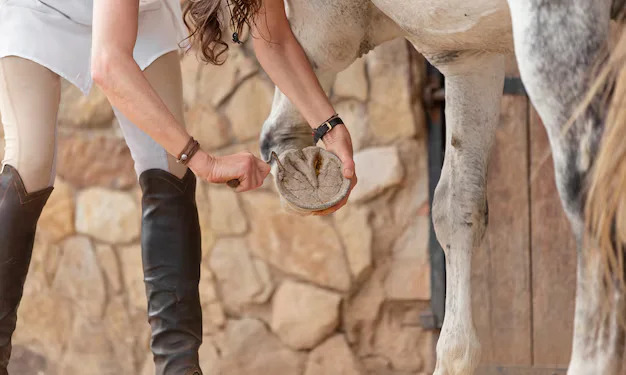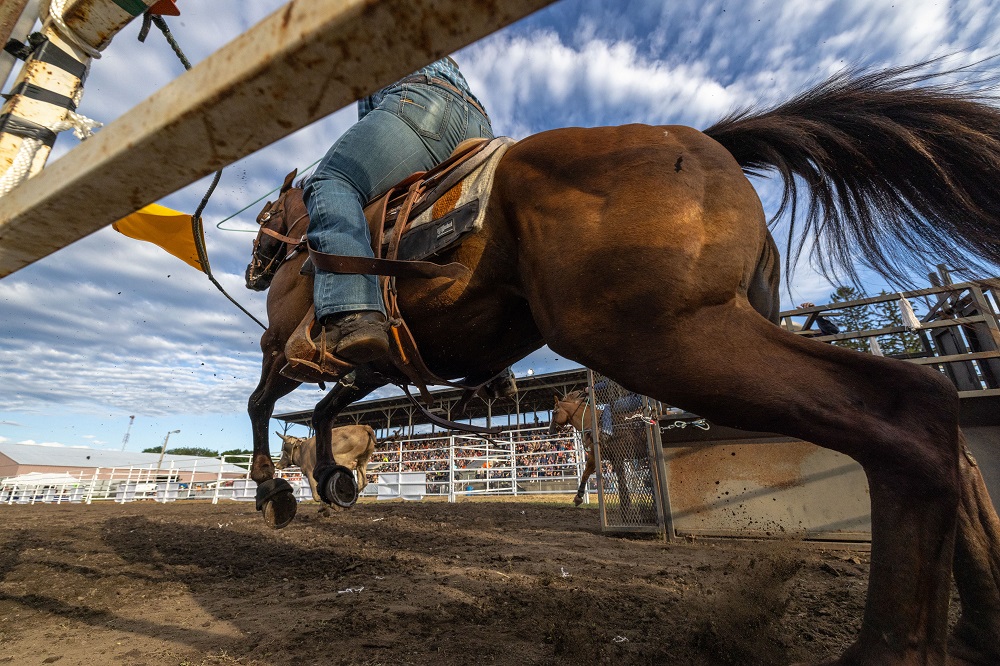Hind limb weakness in horses can significantly compromise their strength and coordination, which lead to lameness if not promptly treated. This condition can affect horses of any age, causing them to shift their weight to the opposite diagonal front leg to maintain balance, further complicating their condition. Recognizing and addressing hind leg weakness early ensures the horse's overall health and mobility.
This article highlights the causes of hind leg weakness in horses, their symptoms, and the treatment available.
Causes of Hind Limb Weakness
Here are some of the health issues that contribute to the severity of hind limb weakness in horses:
- Arthritis: Arthritis is a progressive degenerative joint disease commonly seen in older horses or those with previous injuries or infections. The signs of arthritis in horses' back legs generate stiffness in affected joints, significantly affecting mobility and changing the horse's gait.
- Equine Protozoal Myeloencephalitis (EPM): can cause hind leg weakness in horses due to its impact on the nervous system. EPM is a neurological disease caused by the protozoan parasites Sarcocystis neurona or Neospora hughesi. Hind leg weakness, or paresis, is a common sign of EPM, often accompanied by other neurological symptoms like ataxia (incoordination)
- Laminitis: Laminitis often affects the forelimbs but can also impact the hind feet. This state occurs when blood flow to the hoof's structures is disrupted. If not diagnosed and treated early, it can cause permanent damage.
- Wounds and Fractures: Cuts, wounds, or broken bones can cause a horse to favor a hind leg. Stepping on small pebbles and stones can injure the hoof, making walking difficult. While bruises caused by stepping on stones usually heal independently, untreated cuts and wounds may lead to infections. A visual examination of the horse's hind legs can help detect cuts and sores, but X-rays might be necessary for broken bones or puncture wounds.
- Sprains and Strains: Overworking the horse during training can strain muscles, ligaments, and tendons. Strains are more likely if a horse changes speed abruptly or engages in activities with sudden movements. Overgrown hooves can also increase the likelihood of sprains and strains.
- Bursitis: Bursitis affects the fluid-filled sacs in a joint, causing inflammation due to injury, infected puncture wounds, stress, or strain during training. This condition results in pain, swelling, and stiffness, reducing mobility.
- Pelvic Injuries: Dislocations, fractures, or ligament strains in the horse's pelvis can cause hind leg lameness. These injuries can occur in any horse, though performance horses are at higher risk.
- Spinal Cord Damage: Wobbling while walking may indicate spinal cord damage resulting from falls, illness, infection, or malformed cervical vertebrae. This damage affects the nerves traveling to the hind legs, causing problems.
- Miscellaneous Causes: Joint diseases like osteoarthritis, patella (kneecap) movement issues, and soft tissue injuries are other conditions that can severely affect hind limb mobility.
Symptoms of Hind Leg Problems:

Unless observed with care, it's not always easy to spot hind leg issues, particularly mild ones. If the injury is severe enough or the condition has affected one or both hind legs, the following signs may be noticed:
- Change in gait
- Floppy tail
- Unable to put weight on the injured leg
- Regular shifting of weight to the toe, heel, or outside part of the hoof
- Swelling around a joint
- Inability to stand
- Wounds or deformed joints
- Difficulty stopping smoothly
- Shorter steps on the affected leg
- Unusual head or neck position
- Trouble walking downhill
- More up-and-down movement in one hip when walking or trotting
Diagnosing Hind Limb Weakness
Simple injuries and wounds can be identified by carefully observing the limbs or hoof. For fractures and other bone or joint conditions, diagnostic technologies like radiographic X-rays, ultrasound, and other advanced imaging techniques are often necessary to accurately diagnose the issue. These tools help veterinarians understand the underlying cause of the hind limb weakness and develop an effective treatment plan.
Treatment Options for Hind Leg Weakness
Treatment options for hind leg weakness depend on the cause. Strain-appropriate medications are an option if the cause is injury, stress, or wounds. If the cause is serious, such as bone or joint disorders, along with medications and injections of the appropriate drugs, surgery could also be an option.
Let's understand the various treatment options for hind leg weakness in horses:
- Medications: Pain relievers, anti-inflammatory drugs, and antibiotics for treating pain, inflammation, and infections.
- Rest and Rehabilitation: Adequate rest and gradual reintroduction to exercise under veterinary guidance.
- Physical Therapy: Targeted exercises, hydrotherapy, and massage therapy to strengthen muscles and improve flexibility.
- Surgery: For severe cases such as fractures or advanced joint diseases, including post-surgery care and rehabilitation.
- Diet and Supplements: A well-balanced diet and supplements like glucosamine, chondroitin sulfate and msm can help support normal a normal inflammatory response and joint function.
- Alternative Therapies: Acupuncture and chiropractic adjustments to manage pain and improve recovery.
- Environmental Adjustments: Safe living environment, appropriate bedding, and measures to reduce stress.
The goal must be a well-rounded treatment plan targeting all areas of their health and well-being. Horse joint supplements could be of considerable importance for achieving optimal health, range of motion, and quality of life.
Conclusion:
A comprehensive approach to treating hind limb weakness in horses is vital for adequate recovery and long-term health. By combining medications, rest, physical therapy, surgery, diet, alternative therapies, and environmental modifications, you can provide the best care for your horse.
Ensure your horse receives the best care and treatment for hind leg weakness.
Med Vet Pharm offers many products to support your horse's health and recovery. We've covered you, from horse joint supplements to wound care solutions.
Visit Med-Vet Pharmaceuticals today to explore our products. For expert advice and support, contact us at [833-809-4848]


